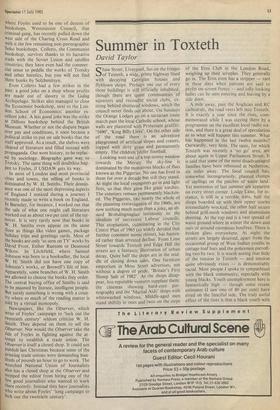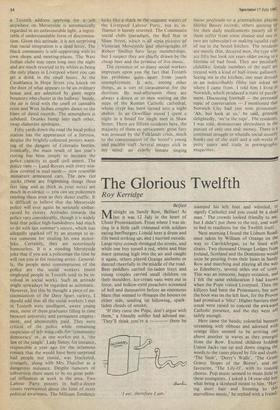Summer in Toxteth
David Taylor
Shaw Street, Liverpool, lies on the fringes of Toxteth, a wide, grimy highway lined with decaying Georgian houses and flyblown shops. Perhaps one out of every three buildings is still officially inhabited, though there are queer communities of squatters and recondite social clubs, ex- isting behind shuttered windows, which the council never finds out about. On Sundays the Orange Lodges go on a sectarian route march past the local Catholic school, whose walls are plastered with Protestant graffiti: `1690', 'King Billy Lives'. On the other side of the road there is an adventure playground of artificial slopes and craters, topped with dirty grass and permanently empty. The children prefer football.
Looking west out of a top-storey window towards the Mersey the sky-line is dominated by the monstrous blocks of flats known as the Piggeries. No one has lived in them for over a decade but still they stand. At night the local youngsters go in and light fires, so that they glow like giant torches. The exteriors remain permanently blacken- ed. The Piggeries, like nearly the whole of the planning extravaganza of the 1960s, are now nothing much more than a joke, an ab- surd Brobdingnagian testimony to the idealism of successive Labour councils. This utopianism, culminating in the City Centre Plan of 1965 (so widely derided that further comment seems otiose), has hasten- ed rather than arrested decline. From Lime Street towards Toxteth and Edge Hill the streets are a fantastic illustration of urban decay. Quite half the shops are in the mid- dle of closing down sales. One furniture emporium in Moss Street advertises, not without a degree of pride, 'Britain's First Slump Sale of 1982'. As the shops disap- pear, less reputable ventures supplant them: the cinemas showing hard-core por- nography and the 'Marital Aids' shops with whitewashed windows. Middle-aged men stand shiftily in ones and twos on the steps of the Eros Club in the London Road, weighing up their scruples. They generally go in. The Eros even has a stripper — rare in these days when patrons are said to prefer on-screen frenzy — and jolly-looking ladies can be seen entering and leaving by a side door.
A mile away, past the Anglican and RC cathedrals, the road veers left into Toxteth. It is exactly a year since the riots, com- memorated while I was staying there by a programme on the excellent local radio sta- tion, and there is a great deal of speculation as to what will happen this summer. What has happened in the last twelve months? Outwardly, very little. The taxis, for which Toxteth was recently a 'no go' area, are about again in Upper Parliament Street. It is said that some of the most disadvantaged families have been rehoused at Netherton, six miles away. The local council has, somewhat incongruously, planted clumps of saplings on the patches of waste land. Yet mementos of last summer are apparent on every street corner. Lodge Lane, for in- stance, is still in a terrible state, half the shops boarded up with their upper stories irremediably wrecked, the other half secure behind grill-mesh windows and aluminium sheeting. At the top end is a vast spread of waste ground where in winter the down and outs sit around enormous bonfires. There is broken glass everywhere. At night the streets are largely deserted, apart from the occasional group of West Indian youths in cottage-loaf hats and the policemen patroll- ing two by two. It is worth noting that little of the tension in Toxteth — and tension quite obviously exists — is demonstrably racial. Most people I spoke to sympathised with the black community, especially with young blacks. Youth unemployment here is fantastically high — though some recent estimates (I saw one of 80 per cent) have erred on the fanciful side. The truly awful effect of the riots is that a black youth with a Toxteth address applying for a job anywhere on Merseyside is automatically regarded in an unfavourable light, a regret- table if understandable form of discrimina- tion. Given this attitude, it is not surprising that racial integration is a dead letter. The black community is self-supporting with its own shops and meeting-places. The West Indian clubs stay open long into the night and are much resorted to by whites as being the only places in Liverpool where you can get a drink in the small hours. At the Casablanca in Hope Street you knock on the door of what appears to be an ordinary house and are admitted by giant negro bouncers who cluster in the hallway. Inside, the air is fetid with the smell of cannabis resin and West Indian couples dance to the blare of dated records. The atmosphere is subdued. Drunks bump into each other, swap elaborate apologies.
Fifty yards down the road the local police station has the appearance of a fortress, despite the brightly-coloured posters warn- ing of the dangers of Colorado beetles. Ironically, the main result of last year's rioting has been simply to increase the police capacity to quell civil unrest. The police vans — Land-Rovers with every win- dow covered in steel mesh — now resemble miniature armoured cars. The new riot sticks (these are frightening things three feet long and as thick as your wrist) are much in evidence — you can see policemen twirling them even as they direct traffic. It is difficult to believe that the Merseyside police will ever again be seriously embar- rassed by rioters. Attitudes towards the police vary considerably, though it is widely held that police high-handedness had much to do with last summer's unrest, which was allegedly sparked off by an attempt to ar- rest someone for stealing his own motor- bike. Certainly, they are notoriously humourless. It is a standing Merseyside joke that if you ask a policeman the time he will run you in for resisting arrest. General- ly, the people most contemptuous of the police are the social workers (most employed people in Toxteth tend to be in- volved in social work). Such an attitude might nowadays be regarded as axiomatic. However, lest this be thought a piece of an- tinomianism of the Dave Spart variety, I should add that all the social workers I met in Toxteth were intelligent, aware young men, most of them graduates filling in time between university and permanent employ- ment, and abominably paid. They were critical of the police while remaining suspicious of left-wing calls for 'community democracy' or, as one worker put it, 'the law of the jungle'. Lady Simey, for instance, responsible a year ago for the infamous remark that she would have been surprised had people not rioted, was bracketed, strangely, along with Mrs Thatcher as a dangerous nuisance. Despite rumours of subversion there seem to be no great polit- cal influences at work in the area. Two Labour Party posters in half-a-dozen streets represented about the limit of overt political awareness. The Militant Tendency
lurks like a shark in the stagnant waters of the Liverpool Labour Party, but its in- fluence is keenly resented. The Communist social clubs (paradigm, the Red Star in Shaw Street, which is all sepia pictures of Victorian Merseyside and photographs of Robert Smillie) have large memberships, but I suspect they are chiefly drawn by the cheap beer and the promise of live music.
The existence of so many social workers impresses upon you the fact that Toxteth has problems quite” apart from youth unemployment. It acts, among other things, as a sort of caravanserai for the destitute. By mid-afternoon there are always a dozen or so men waiting on the steps of the Roman Catholic cathedral, whose crypt has been turned into a night shelter. In an Orwellian mood I spent a night in a hostel for single men in Shaw Street. There are fifteen residents here, the majority of them ex-servicemen: great fury was aroused by the Falklands crisis, much to the consternation of the hostel's young and pacifist staff. Several images stick in my mind: an elderly inmate singing
basso .profundo to a gramophone playing Shirley Bassey records, others queuing up for their daily medicaments (nearly all of them suffer from some disease and one or two are tubercular) or making squalid cups of tea in the hostel kitchen. The residents are mostly thin, decayed men, the type who are fifty but look ten years older owing to a lifetime of bad food. They are peculiarly childlike: female members of the staff are treated with a kind of half-ironic gallantry. Seeing me in the kitchen, one man dressed in an indescribably filthy suit asked me where I came from. I told him I lived in Norwich, which produced a stare of puzzle' ment. Discussing football — the perennial topic of conversation — I mentioned that Norwich City had just won promotion. `Ah, but look at us,' he said, grinning delightedly, 'we're the tops'. The residents, I was told, demonstrate shrewdness in the pursuit of only one end: money. There is a continual struggle to wheedle social security books out of the staff and a sub-world of petty usury and trade in pornographic magazines.



































 Previous page
Previous page